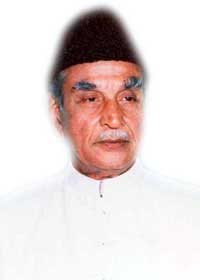
Search the Republic of Rumi |
|
"Hakim Said: An Obituary Written in collaboration with Meesam Rizvi
Hakim Said was the last of the dinosaurs. He belonged to the "pre-historic" times of our country, the days before Pakistan when the Muslim society in the Northern India was cast in the imprint of the Aligarh Movement. One of the main characteristics of that culture was a positive pride in national service. Hakim Said was a relic of that culture, and his contribution can hardly be understood without keeping this point in mind. While the scholarly worth of his more than 150 books is yet to be established by the critics, his one singular contribution that gives him an undisputed position in the gallery of our national history is his philanthropic service for the cause of education. He had the wealth, the ambition and the opportunities that could have distracted another person to many other venues. But Hakim Said remained dedicated to his one dream of setting up institutions for quality education, and that he did in the spirit of the great Indian Muslim philanthropists of the last century – an extinct species. Hakim Said was born on the 9th of January 1920, into a family that had practiced Hikmat for several generations. When Pakistan came into being he immediately migrated to Pakistan, as he was very much impressed by the personality of Muhammad Ali Jinnah. In Pakistan he established himself as a renowned Hakim, eminent Scholar, well-known writer, good organizer and an experienced tourist. Medicine, Health, Islam, History and Science were his subjects of interest. He was a leading member in many national and international welfare and scientific organizations. He was the President of Hamdard Foundation Pakistan, Chancellor of Hamdard University, Founder and President of Hamdard College for Eastern Medicine, Vice President of International Association for the Study of Traditional Asian Medicine (Australia) and Advisor to the President of Pakistan for Medicine. Of course, he was also the man behind the Hamdard Laboratories in Pakistan as well as being connected to International Organization of Islamic Medicine (Kuwait), Institute of Health and Research Medicine, Association for Advancement of Libraries, Pakistan Historical Society and Cancer Association Pakistan. Hakim Said was the author of about 150 books in the several fields of his interest, in which he also wrote more than 700 thesis in English and more than 1000 in Urdu. He also edited some journals of international repute as, such as UNESCO Piami (Urdu Edition UNESCO Courier), Hamdard Islamicus, Hamdard Medicus, Medical Times and Hamdard Sehat. He also attended over 70 International Conferences while organizing many others. Hikmat being his profession he had natural impulses for sympathy in his heart especially for the children, to whom he always referred as naunehals. On several occasions he expressed his wish for a revolution in the thinking of the younger generation to replace the gun with the pen in their hands. In the mid-eighties he established the forum Jawan-e-Imroz, which provided a venue for expression to the youth ofthecountry in those decadent times when all other channels of healthy recreation were coming to a close. The activities of this forum later fizzled out as Hakim Said’s attention was diverted more towards the setting up of a "City of Knowledge", complete with educational institutions of high standards. Madinat-ul-Hikmah, as it came to be known, ultimately took shape as a center for the old and advanced sciences, and its universities are now counted amongst the finest in Asia and accredited worldwide. This is located in the northwestern suburbs of Karachi, about 35km away from the City Center. The Campus of Madinat-ul-Hikmah is spread over 350 acres, with its own residential accommodation. Bait-ul-Hikmah, the main library, has about 4 million books, periodicals, journals and an update electronic communication network, which makes it one of the biggest libraries in Asia. The University, which is the main hub of activity here, comprises of five institutions. Hamdard Institute of Management Sciences (HIMS) offers BBA and MBA programs, Hamdard Institute of Information Technology (HIIT) offers BE, BCS, MS and PGD, Hamdard College for Medicine (HCM) offers MBBS, Hamdard Institute of Education and Social Sciences (HIESS) offers B.Ed., M.Ed and doctorate in education while Hamdard College for Eastern Medicine (HCEM) offers BEMS. These institutions had a total of over 1000 students on their rolls in late 1997. Hakim Said also served as the Governor of Sindh for a brief period of two months. Even in that short time he laid down foundation of five universities in the province. Hakim Said’s philanthropic work had earned him more respect from his country fellows than any other person alive in his own days, with the only exception of Abdul SattarAidhi. When he was brutally slain in the early hours of Oct 17, 1998, the news of his death was received as a personal shock by many people across the breadth of Pakistan, and even abroad. No human being is without faults, and Hakim Said too was human. But even his worst critic would hesitate from disagreeing with the fact that for the sheer nobility of his goals Hakim Said stood out far above his peers (or, should we say, without any peers). Many hearts were touched when on his funeral someone recited a famous verse from the Holy Quran: "And do not consider those who were slain in the Allah’s way as dead. Nay, they are alive, but you don’t perceive." |
He had the wealth, the ambition and the opportunities that could have distracted another person to many other venues. But Hakim Said remained dedicated to his one dream of setting up institutions for quality education...
|
||
 ZAMEEN, February/March 1999
ZAMEEN, February/March 1999